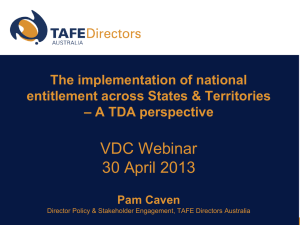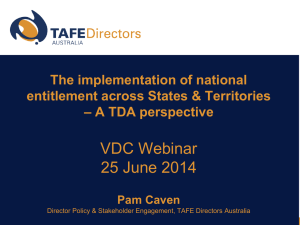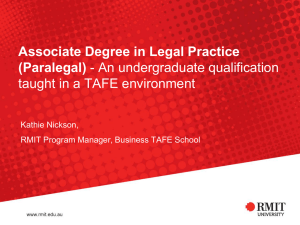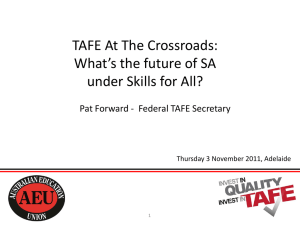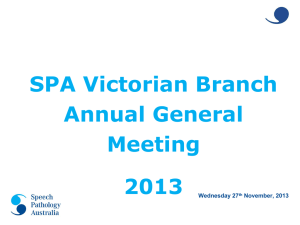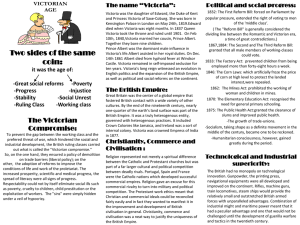here - TAFE Directors Australia
advertisement
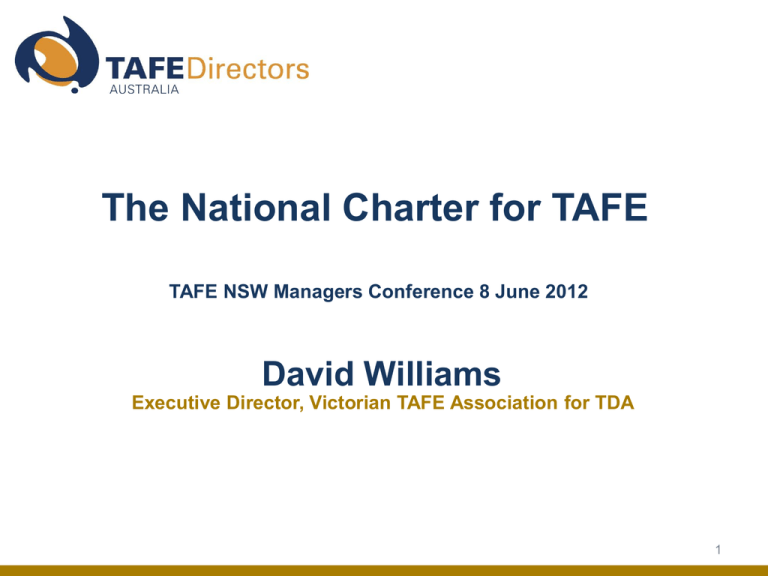
The National Charter for TAFE TAFE NSW Managers Conference 8 June 2012 David Williams Executive Director, Victorian TAFE Association for TDA 1 Why a National TAFE Charter? TDA believed it was time to go beyond the rhetoric and for the Federal, State and Territory governments to: affirm the significance of TAFE in delivering on the Government’s productivity and participation agenda define the role, scope and responsibilities of TAFE commit to administrative and funding arrangements that will enable TAFE providers to perform this role effectively 4 key principles were developed. 2 Principle 1 Funding of public VET provides value for money and is sufficient for the comprehensive educational and training services necessary to achieve COAG goals. 1 The continued viability of public TAFE institutions as ‘full service providers’ is an integral component of the ‘Implementation Plans’ of all jurisdictions in a national VET entitlement system. This requires fair and adequate funding of TAFE services, to meet community service obligations, and ensure accessible and equitable programs, with support service available to individuals, industries and communities. 1. National Partnership Agreement on Skills Reform, April 2012, Clause 28 and 29 3 Principle 2 Quality criteria are substantially enhanced as the basis of value for money in public funding for a competitive VET system. Government funding decisions require the application of coherent and nationally consistent quality criteria that assure: • Enhanced standards for national registered training organisations, beyond minimum registration requirements; • Contractual obligations for all Registered Training Organisations (RTOs) receiving public funding for VET programs including the requirement for full and continuing compliance with the quality standards required by the SNVR, the AQF and agreed validation measures. 4 Principle 3 Governance enables flexibility and responsiveness. Healthy competition depends on transparency, accountability and devolution of governance. An equal and transparent regulatory framework for all providers is a fundamental cornerstone of national competition policy. • Sufficient authority must be devolved to TAFE Institutes to enable them to respond flexibly in competitive training markets. • Equivalent standards of transparent reporting and accountability should be required of all VET providers in receipt of public funds. • Additional and specific functions, including statutory functions of TAFE Institutes, to receive supplementary funding. 5 Principle 4 Recognition of the innovation and leadership roles of TAFE, including its pivotal position in rural and regional Australia. The public provider network of TAFE institutions underpins employment, productivity, regional communities and future workforce development. To achieve COAG economic goals, governments should engage with TAFE providers as the VET industry leaders. 6 Victorian TAFE Association Inc Key features of Skills Reform in Qld • Qld below national average for VET participation across all age demographics (in NSW about 9.5% of 15 to 64 year old participate in VET, in Qld about 7%). • Peter Noonan undertook a review in 2011 that was then referred to a Ministerial Taskforce. • Newman government elected and reviewing future VET policy. • Government has just announced it will join National Regulator ASQA and legislation is being drafted. • Entitlement system is proposed to provide a guaranteed VET place for qualifications up to and including Cert III, other details yet to be determined. 7 Victorian TAFE Association Inc Key features of Skills Reform in Qld (Continued) • Governance will probably include a broad transition to Statutory Bodies for all Institutes (Southbank and Gold Coast already have this status). • IR reform at the moment being considered in the form of transitioning employment powers to new statutory entities with a transition of existing salaries and conditions and consideration to move to each entity developing its own EAs. • Details of quality assurance standards for entry into contestable market and role of public provider still being developed. 8 Victorian TAFE Association Inc Skills for All in SA • TAFE SA has been created as a statutory authority whose CEO reports to a governing Council (which happens to be the senior exec team of the Department). The 3 TAFE Providers in SA. South, North and Regional CEOs report directly to the CEO of TAFE SA. • SA quality assurance is through ASQA the National Regulator • All SAs aged 16 and over will be eligible for a government subsidised place. • Certs I & II no student fees, above these levels fees apply and are very complex, based upon units of study not qualification being studied. There will be minimum and maximum fees and concessions will continue to apply. • Diploma and above qualifications will have access to VET Fee Help income contingent loans through the Commonwealth, trial of loans at Cert IV. 9 Victorian TAFE Association Inc Skills for All in SA (contd.) • Eligibility criteria to subsidised places are complex but students do get second chances to study at the same or lower level than the qualification level they currently hold. • Priority quals attract additional funding. • Contestability of TAFEs with Private RTOs. Over 200 private RTOs expressed interest in being approved for SA government subsidised training – as at mid May 2012 only 6 providers approved – quality bar is quite high. • Public TAFE average SCH rate is $17 per hour. Private RTOs average SCH will be funded at $9 per hour. • Staff transferred to employees of the Statutory Body TAFE SA. 10 Victorian TAFE Association Inc Victorian Skills Reform • Current version of policy on the run involves eligibility criteria that provides a government subsidised place for under 20 year olds or those studying at a qualification level higher than currently held for students over 20 years of age - exclusions are foundation skills and apprenticeships. Non eligible students automatically full fee paying. • Maximum of 2 courses per student that can be enrolled in during a Calendar year. • Fees charged to students now uncapped, no hourly or yearly maximum. 11 Victorian TAFE Association Inc Victorian Skills Reform (contd.) • VET Fee Help income contingent loans available for Diploma level and above and trial at Cert IV level in 2013/2014. • 5 bands of funding provided to RTO / TAFE with level Band A (apprenticeships) funded @ greater than $10 per SCH and Band E funded @ less than $2.00 per SCH (e.g. many hospitality programs Cert I to III - non apprentice, business & business administration Certs I to III, Sport & Recreation Cert II to IV, Cert III and IV Fitness). • The revised funding Bands result in 20% of programs getting a SCH funding increase and 80% getting a decrease. 12 Victorian TAFE Association Inc Victorian Skills Reform (contd.) • 5% loading for all RTOs for training delivered in nonmetropolitan area. • New 1.3 loading for low SES youth but methodology of determining SES status yet to be designed. • RPL funded at 100% for Band A and 50% for Bands B to E. • 18 TAFEs and 410 private RTOs now all funded at same $ rate, no differential. Community Service and statutory obligation funding previously paid to TAFE as ‘full service providers’ to be discontinued as of 1 January 2013 (equates to about $170M per annum). 13 Victorian TAFE Association Inc Victorian Skills Reform (contd.) • Approximately ½ of RTOs regulated by ASQA (those delivering across State borders or international) and the other ½ by Vic Registration and Qualifications Authority. • State ITBs all defunded from 1 July. • Vic Skills Commission disbanded from 1 July. • New Industry Skills Consultative Committee and Annual Industry Skills Conference. • TAFEs will be allowed flexibility to negotiate individual EAs rather than MBA preference the government held in the past. 14 Victorian TAFE Association Inc Victorian Skills Reform The case study of what not to do! Do not build a skills reform agenda on foundations laid in quicksand. Solid and sound modelling, informed industry and students, high level quality criteria and performance standards are a mandatory pre-requisites for moving from a progressively contracted for delivery market to a managed market. Certainly not an open slather market. 15 Victorian TAFE Association Inc Coming back to TDA National Charter and the Federal / State National Partnership Agreement on Skills Reform, it makes sense to have a nationally consistent approach to: • Eligibility criteria for access to government supported place • Quality standard for entry into government supported training market • Minimum support requirements for TAFEs operating in a more contestable market • Clear recognition and support for TAFEs as public providers delivering a broad range of training and support services to a wide range of students including in regional and remote locations • Support services for employers and students to allow for them to make informed choices. 16 Victorian TAFE Association Inc Thank you 17
